中考英语动词的时态解题技巧及练习题(含答案)
【英语】中考必备英语动词的时态技巧全解及练习题(含答案)

【英语】中考必备英语动词的时态技巧全解及练习题(含答案)一、初中英语动词的时态1.— I think the plan is just a waste of time. What do you think?—Well, if you don’t support the plan, ________.A.neither do I B.so do I C.neither will I D.so will I【答案】C【解析】句意:——我认为这个计划只是在浪费时间。
您是怎么想的?——好,如果你不支持这个计划,我也不支持。
Neither+助动词+主语,表示主语也不是……;这里是if引导的条件状语从句,主句用一般将来时,从句用一般现在时态,这里是主句,故助动词用will。
根据题意,故选C。
点睛:Neither+助动词+主语,表示主语也不是这样;so+助动词+主语,表示主语也是这样。
2.— Who the classroom tomorrow, Tony?— Our group.A.will clean B.cleans C.cleaned D.clear【答案】A【解析】句意:——托尼,明天谁打扫教室?——我们小组。
考查一般将来时。
根据提示词tomorrow可知时态用一般将来时,其构成为:will+动词原形;故答案选A。
3.-Has your cousin arrived in Beijing yet?--Yes. She Beijing since yesterday morning.A.arrived in B.has arrived in C.has been in D.has been to【答案】C【解析】句意:你表弟到北京了吗?-是的。
她从昨天起就在北京了。
since yesterday morning自昨天早晨以来,表示的是截止到目前为止的时间段,用于现在完成时态,排除A;arrived为短暂性动词,不能与表示一段的时间状语连用;have been to表示某人去过某地,也不能与表示一段的时间状语连用,故答案为C。
中考英语初中英语动词的时态解题技巧及经典题型及练习题(含答案)
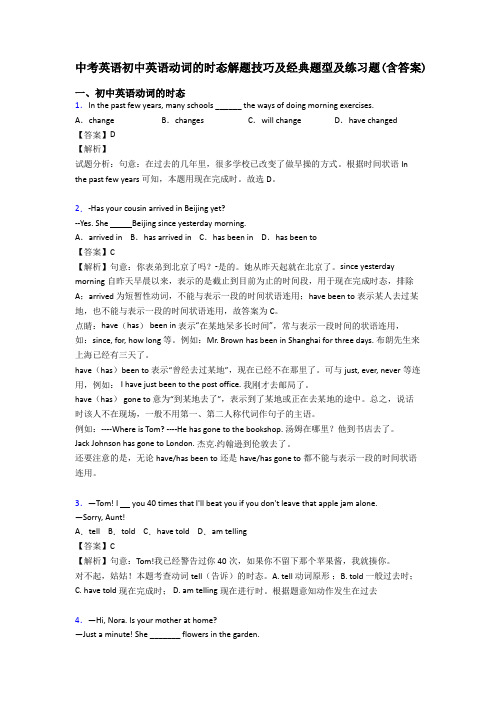
中考英语初中英语动词的时态解题技巧及经典题型及练习题(含答案)一、初中英语动词的时态1.In the past few years, many schools ______ the ways of doing morning exercises.A.change B.changes C.will change D.have changed【答案】D【解析】试题分析:句意:在过去的几年里,很多学校已改变了做早操的方式。
根据时间状语Inthe past few years可知,本题用现在完成时。
故选D。
2.-Has your cousin arrived in Beijing yet?--Yes. She Beijing since yesterday morning.A.arrived in B.has arrived in C.has been in D.has been to【答案】C【解析】句意:你表弟到北京了吗?-是的。
她从昨天起就在北京了。
since yesterday morning自昨天早晨以来,表示的是截止到目前为止的时间段,用于现在完成时态,排除A;arrived为短暂性动词,不能与表示一段的时间状语连用;have been to表示某人去过某地,也不能与表示一段的时间状语连用,故答案为C。
点睛:have(has) been in 表示“在某地呆多长时间”,常与表示一段时间的状语连用,如:since, for, how long 等。
例如:Mr. Brown has been in Shanghai for three days. 布朗先生来上海已经有三天了。
have(has)been to表示“曾经去过某地”,现在已经不在那里了。
可与just, ever, never等连用,例如: I have just been to the post office. 我刚才去邮局了。
have(has) gone to 意为“到某地去了”,表示到了某地或正在去某地的途中。
初中英语动词的时态答题技巧及练习题(含答案)含解析
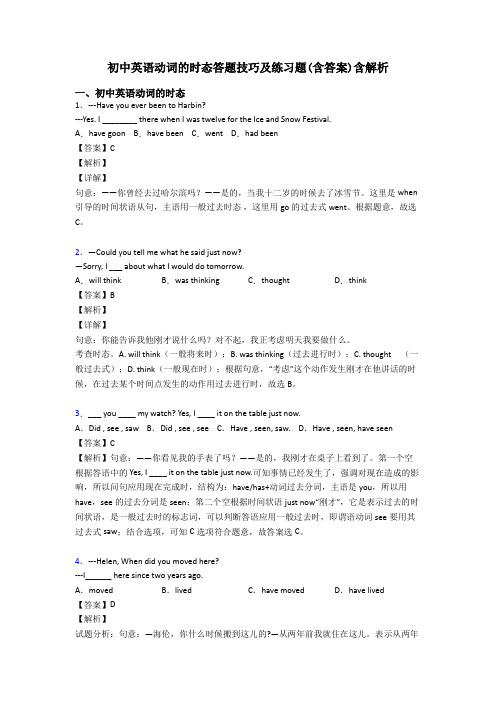
初中英语动词的时态答题技巧及练习题(含答案)含解析一、初中英语动词的时态1.---Have you ever been to Harbin?---Yes. I ________ there when I was twelve for the Ice and Snow Festival.A.have goon B.have been C.went D.had been【答案】C【解析】【详解】句意:——你曾经去过哈尔滨吗?——是的,当我十二岁的时候去了冰雪节。
这里是when 引导的时间状语从句,主语用一般过去时态,这里用go的过去式went。
根据题意,故选C。
2.—Could you tell me what he said just now?—Sorry, I ___ about what I would do tomorrow.A.will think B.was thinking C.thought D.think【答案】B【解析】【详解】句意:你能告诉我他刚才说什么吗?对不起,我正考虑明天我要做什么。
考查时态。
A. will think(一般将来时);B. was thinking(过去进行时);C. thought (一般过去式);D. think(一般现在时);根据句意,“考虑”这个动作发生刚才在他讲话的时候,在过去某个时间点发生的动作用过去进行时,故选B。
3.___ you ____ my watch? Yes, I ____ it on the table just now.A.Did , see , saw B.Did , see , see C.Have , seen, saw. D.Have , seen, have seen【答案】C【解析】句意:——你看见我的手表了吗?——是的,我刚才在桌子上看到了。
第一个空根据答语中的Yes, I ____ it on the table just now.可知事情已经发生了,强调对现在造成的影响,所以问句应用现在完成时,结构为:have/has+动词过去分词,主语是you,所以用have,see的过去分词是seen;第二个空根据时间状语just now“刚才”,它是表示过去的时间状语,是一般过去时的标志词,可以判断答语应用一般过去时,即谓语动词see要用其过去式saw;结合选项,可知C选项符合题意,故答案选C。
中考英语动词的时态解题技巧及经典题型及练习题(含答案)
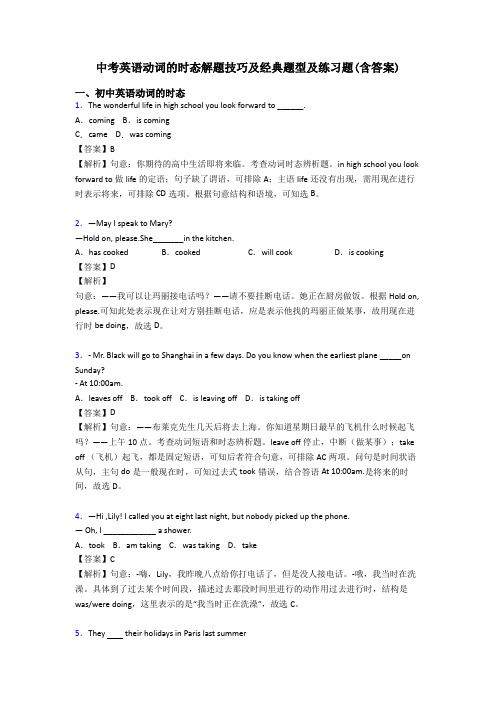
中考英语动词的时态解题技巧及经典题型及练习题(含答案)一、初中英语动词的时态1.The wonderful life in high school you look forward to ______.A.coming B.is comingC.came D.was coming【答案】B【解析】句意:你期待的高中生活即将来临。
考查动词时态辨析题。
in high school you look forward to做life的定语;句子缺了谓语,可排除A;主语life还没有出现,需用现在进行时表示将来,可排除CD选项。
根据句意结构和语境,可知选B。
2.—May I speak to Mary?—Hold on, please.She_______in the kitchen.A.has cooked B.cooked C.will cook D.is cooking【答案】D【解析】句意:——我可以让玛丽接电话吗?——请不要挂断电话。
她正在厨房做饭。
根据Hold on, please.可知此处表示现在让对方别挂断电话,应是表示他找的玛丽正做某事,故用现在进行时be doing,故选D。
3.- Mr. Black will go to Shanghai in a few days. Do you know when the earliest plane _____on Sunday?- At 10:00am.A.leaves off B.took off C.is leaving off D.is taking off【答案】D【解析】句意:——布莱克先生几天后将去上海。
你知道星期日最早的飞机什么时候起飞吗?——上午10点。
考查动词短语和时态辨析题。
leave off停止,中断(做某事);take off (飞机)起飞,都是固定短语,可知后者符合句意,可排除AC两项。
问句是时间状语从句,主句do是一般现在时,可知过去式took错误,结合答语At 10:00am.是将来的时间,故选D。
中考英语动词的时态解题技巧和训练方法及练习题(含答案)

中考英语动词的时态解题技巧和训练方法及练习题(含答案)一、初中英语动词的时态1.My grandma ______ a song with her friends when I came back.A.sings B.sang C.is singing D.was singing【答案】D【解析】句意:当我回来的时候,我的祖母正和她的朋友一起唱歌。
根据when I came back 可知此处表示过去某时正在做某事,故用过去进行时,故选D。
2.My mother when I got home yesterday.A.will cook B.cooks C.has cooked D.was cooking【答案】D【解析】句意:当我昨天回到家的时候,我的妈妈正在做饭。
考查的是过去进行时。
根据when引导的一般过去时的时间状语从句推断主句描述的是过去某个时间正在发生的动作,故用过去进行时态,过去进行时的构成是:主语+was/were+动词的现在分词,主语是第三人称单数所以be动词用was,cook的现在分词是cooking;故答案选D。
3.—Linda is not coming for the party tonight.—But she _.A.promises B.promised C.will promise D.had promised【答案】B【解析】【详解】句意:---琳达今晚不来参加晚会了吗?----但她答应了。
考查动词时态。
A. promises一般现在时,第三人称单数;B. promised一般过去时;C. will promise一般将来时;D. had promised过去完成时。
根据上文是现在进行时,结合语境可知原先答应,可知用一般过去时。
故选B。
4.—May I speak to Mary?—Hold on, please.She_______in the kitchen.A.has cooked B.cooked C.will cook D.is cooking【答案】D【解析】句意:——我可以让玛丽接电话吗?——请不要挂断电话。
【英语】初中英语动词的时态及其解题技巧及练习题(含答案)及解析
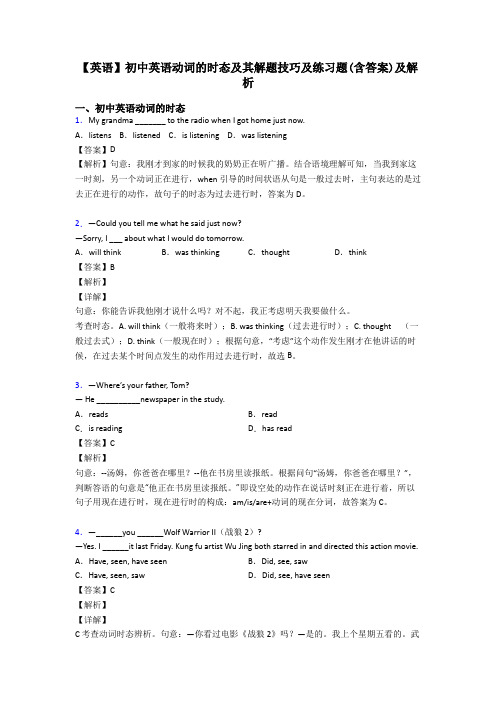
【英语】初中英语动词的时态及其解题技巧及练习题(含答案)及解析一、初中英语动词的时态1.My grandma _______ to the radio when I got home just now.A.listens B.listened C.is listening D.was listening【答案】D【解析】句意:我刚才到家的时候我的奶奶正在听广播。
结合语境理解可知,当我到家这一时刻,另一个动词正在进行,when引导的时间状语从句是一般过去时,主句表达的是过去正在进行的动作,故句子的时态为过去进行时,答案为D。
2.—Could you tell me what he said just now?—Sorry, I ___ about what I would do tomorrow.A.will think B.was thinking C.thought D.think【答案】B【解析】【详解】句意:你能告诉我他刚才说什么吗?对不起,我正考虑明天我要做什么。
考查时态。
A. will think(一般将来时);B. was thinking(过去进行时);C. thought (一般过去式);D. think(一般现在时);根据句意,“考虑”这个动作发生刚才在他讲话的时候,在过去某个时间点发生的动作用过去进行时,故选B。
3.—Where’s your father, Tom?— He __________newspaper in the study.A.reads B.readC.is reading D.has read【答案】C【解析】句意:--汤姆,你爸爸在哪里?--他在书房里读报纸。
根据问句“汤姆,你爸爸在哪里?”,判断答语的句意是“他正在书房里读报纸。
”即设空处的动作在说话时刻正在进行着,所以句子用现在进行时,现在进行时的构成:am/is/are+动词的现在分词,故答案为C。
中考英语动词的时态解题技巧分析及练习题(含答案)

中考英语动词的时态解题技巧分析及练习题(含答案)一、初中英语动词的时态1.— I think the plan is just a waste of time. What do you think?—Well, if you don’t support the plan, ________.A.neither do I B.so do I C.neither will I D.so will I【答案】C【解析】句意:——我认为这个计划只是在浪费时间。
您是怎么想的?——好,如果你不支持这个计划,我也不支持。
Neither+助动词+主语,表示主语也不是……;这里是if引导的条件状语从句,主句用一般将来时,从句用一般现在时态,这里是主句,故助动词用will。
根据题意,故选C。
点睛:Neither+助动词+主语,表示主语也不是这样;so+助动词+主语,表示主语也是这样。
2.—My grandma looking at that photo on the wall.—I can understand. It helps her remember her childhood.A.enjoys B.enjoyedC.was enjoying D.will enjoy【答案】A【解析】句意:——我奶奶喜欢看墙上的那个照片。
——我能理解,它能帮她想起她的童年。
A. enjoys喜欢,用于一般现在时态,主语单三时; B. enjoyed 喜欢,用于一般过去时态;C. was enjoying 喜欢,用于过去进行时态,主语单三时;D. will enjoy喜欢,用于一般将来时态;根据It helps her remember her childhood.可知用一般现在时态;故选A3.We a few museums while we were in London.A.visit B.visitedC.have visited D.are visiting【答案】B【解析】句意:当我在伦敦时,我参观了几个博物馆。
初中必备英语动词的时态技巧全解及练习题(含答案)含解析

初中必备英语动词的时态技巧全解及练习题(含答案)含解析一、初中英语动词的时态1.—I don’t know when _________tomorrow. —I will call you as soon as he _________. A.will he come…arrives B.he will come…arrives C.he will come…will arrive【答案】B【解析】句意:我不知道他明天什么时候会来。
他一来我就会给你打电话的。
前一个句子是宾语从句,语序为陈述句的语序,根据tomorrow判断,时态为一般将来时态,排除A;第二个句子为as soon as引导的时间状语从句,主句为一般将来时,时间状语从句为一般现在时,故选B 。
2.—Shall we play tennis now?—Sorry, I can’t. I my homework.A.do B.did C.have done D.am doing【答案】D【解析】句意:——我们现在打网球去好吗?——对不起,我不能去,我在做作业。
A. do 做,用于一般现在时态,主语复数时; B. did做,用于一般过去时态; C. have done 做,用于一般现在完成时态; D. am doing做,用于现在进行时态,主语是I时;根据now可知用现在进行时态,故选D3.―Tom! I you 40 times that I'll beat you if you don't leave that apple jam alone.―Sorry, Aunt!A.tell B.told C.have told D.am telling【答案】C【解析】句意:Tom!我已经警告过你40次,如果你不留下那个苹果酱,我就揍你。
对不起,姑姑!本题考查动词tell(告诉)的时态。
A. tell 动词原形;B. told 一般过去时;C. have told 现在完成时;D. am telling现在进行时。
英语动词的时态常见题型及答题技巧及练习题(含答案)及解析
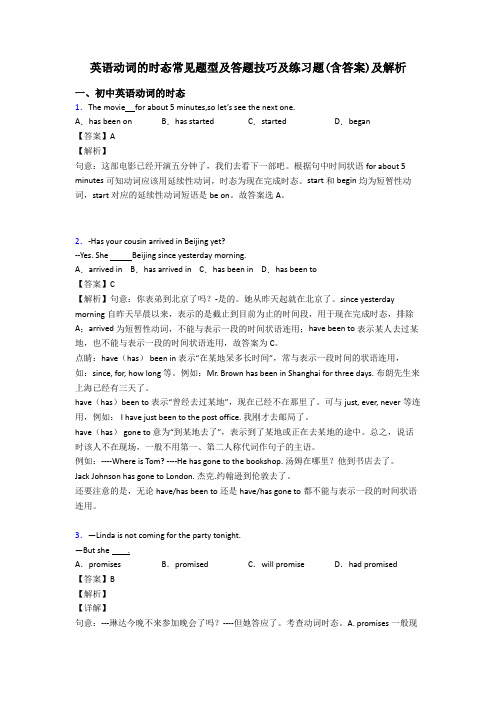
A.leftB.leave
C.will leaveD.has left
【答案】C
【解析】
【详解】
句意:火车一小时后出发。我现在必须去火车站。A. left一般过去时;B. leave一般现在时;C. will leave一般将来时;D. has left现在完成时。in an hour一个小时后,表示的是将来的时间,因此句子的时态用一般将来时,其构成为will+动词原形,故答案为C。
have(has)gone to意为“到某地去了”,表示到了某地或正在去某地的途中。总之,说话时该人不在现场,一般不用第一、第二人称代词作句子的主语。
例如:----Where is Tom? ----He has gone to the bookshop.汤姆在哪里?他到书店去了。
Jack Johnson has gone to London.杰克.约翰逊到伦敦去了。
8.—Why didn't you open the door for me just now?
—Sorry,Ia bath.
A.will take B.am taking C.was taking D.take
【答案】C
【解析】
【详解】
句意:--刚才你为什么不给我开门?--对不起,我在洗澡。根据didn't you open the door这里叙述的是过去的事情,根据句意可知该开门的时间正在洗澡,也就是说过去某个时间正在进行的动作,应该用过去进行时。过去进行时的谓语动词的形式是:was/were+doing,故选C。
初中英语动词的时态及其解题技巧及练习题(含答案)含解析

初中英语动词的时态及其解题技巧及练习题(含答案)含解析一、初中英语动词的时态1.一Guilin is a wonderful place. I there many years ago.一Yes. I there many times.A.went; have been B.have gone; wentC.went; have gone D.have been;went【答案】A【解析】句意:-桂林是个很棒的地方。
我多年前去过那里。
-是的。
我去过那里很多次。
many years ago很多年前,跟一般过去时态连用,所以谓语动词使用go的过去式went。
下文表示过去的动作对现在造成的影响与结果,所以谓语动词使用现在完成时态,have/has+动词的过去分词,have/has been to.. , 意为“曾经去过某地”,有“去过某地”的经历; have/has gone to…, 意为“去了某地”,人不在说话地点。
本句表示“曾经去过某地”。
故选:A。
2.–What’s your father doing now? –He ______ the room.A.cleaned B.cleans C.has cleaned D.is cleaning【答案】D【解析】【详解】句意:——你父亲现在在干什么?——他在打扫房间考查动词时态。
cleaned一般过去时;cleans一般现在时;has cleaned现在完成时;is cleaning现在进行时。
根据问句可知此句时态是现在进行时;故选D。
3. I _____ Chinese dishes for my foreign friends tomorrow evening.A.will cook B.have cookedC.cook D.cooked【答案】A【解析】试题分析:句意:明天晚上我将为我的外国朋友做中国菜。
根据时间状语tomorrow evening可知,句子应该用一般将来时,故选A。
【英语】中考英语动词的时态答题技巧及练习题(含答案)
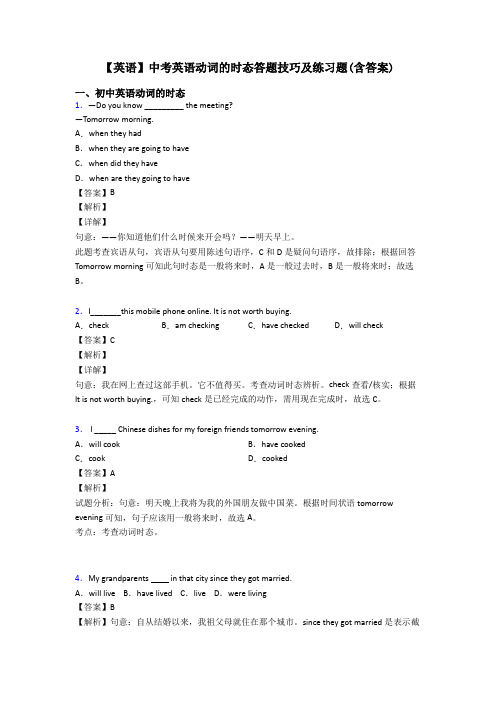
【英语】中考英语动词的时态答题技巧及练习题(含答案)一、初中英语动词的时态1.—Do you know _________ the meeting?—Tomorrow morning.A.when they hadB.when they are going to haveC.when did they haveD.when are they going to have【答案】B【解析】【详解】句意:——你知道他们什么时候来开会吗?——明天早上。
此题考查宾语从句,宾语从句要用陈述句语序,C和D是疑问句语序,故排除;根据回答Tomorrow morning可知此句时态是一般将来时,A是一般过去时,B是一般将来时;故选B。
2.I_______this mobile phone online. It is not worth buying.A.check B.am checking C.have checked D.will check【答案】C【解析】【详解】句意:我在网上查过这部手机。
它不值得买。
考查动词时态辨析。
check查看/核实;根据It is not worth buying.,可知check是已经完成的动作,需用现在完成时,故选C。
3. I _____ Chinese dishes for my foreign friends tomorrow evening.A.will cook B.have cookedC.cook D.cooked【答案】A【解析】试题分析:句意:明天晚上我将为我的外国朋友做中国菜。
根据时间状语tomorrow evening可知,句子应该用一般将来时,故选A。
考点:考查动词时态。
4.My grandparents in that city since they got married.A.will live B.have lived C.live D.were living【答案】B【解析】句意:自从结婚以来,我祖父母就住在那个城市。
中考英语动词的时态答题技巧及练习题(含答案)
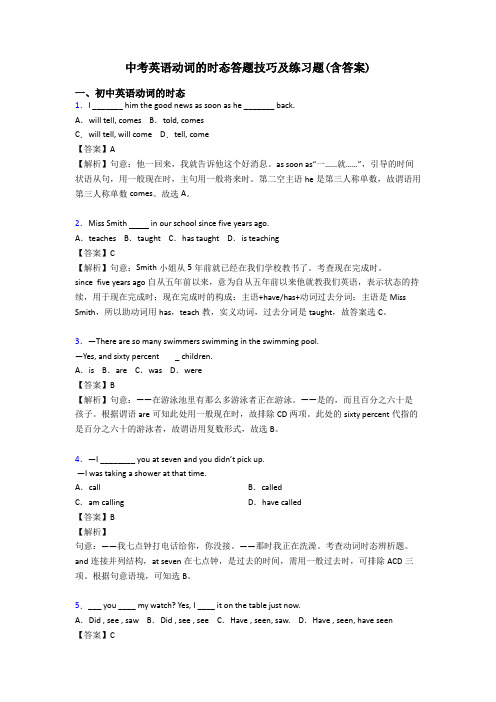
中考英语动词的时态答题技巧及练习题(含答案)一、初中英语动词的时态1.I _______ him the good news as soon as he _______ back.A.will tell, comes B.told, comesC.will tell, will come D.tell, come【答案】A【解析】句意:他一回来,我就告诉他这个好消息。
as soon as“一……就……”,引导的时间状语从句,用一般现在时,主句用一般将来时。
第二空主语he是第三人称单数,故谓语用第三人称单数comes。
故选A。
2.Miss Smith in our school since five years ago.A.teaches B.taught C.has taught D.is teaching【答案】C【解析】句意:Smith小姐从5年前就已经在我们学校教书了。
考查现在完成时。
since five years ago自从五年前以来,意为自从五年前以来他就教我们英语,表示状态的持续,用于现在完成时;现在完成时的构成:主语+have/has+动词过去分词;主语是Miss Smith,所以助动词用has,teach教,实义动词,过去分词是taught,故答案选C。
3.—There are so many swimmers swimming in the swimming pool.—Yes, and sixty percent _ children.A.is B.are C.was D.were【答案】B【解析】句意:——在游泳池里有那么多游泳者正在游泳。
——是的,而且百分之六十是孩子。
根据谓语are可知此处用一般现在时,故排除CD两项。
此处的sixty percent代指的是百分之六十的游泳者,故谓语用复数形式,故选B。
4.—I ________ you at seven and you didn’t pick up.—I was taking a shower at that time.A.call B.calledC.am calling D.have called【答案】B【解析】句意:——我七点钟打电话给你,你没接。
(英语)中考必备英语动词的时态技巧全解及练习题(含答案)

(英语)中考必备英语动词的时态技巧全解及练习题(含答案)一、初中英语动词的时态1.Mary with her parents to Hong Kong. They’ll stay there for two weeks.A.have been B.have gone C.has been D.has gone【答案】D【解析】【详解】句意:玛丽和她的父母一起去了香港,他们打算在那里待一个星期。
考查主谓一致和现在完成时。
根据后面They’ll stay there for tw o weeks.一句话,可知玛丽和她的父母待在香港两周了,一起去了香港,并且还没有回来,所以用have/has gone to;have/has been to 则表示去过某地(已经回来);主语后面由with结构时,谓语动词由前面的主语决定单复数,根据主语Mary判断用助动词has.故选D。
【点睛】现在完成时的标志词already(肯定), yet(否定,疑问), just, before, recently, still, lately, never, ever, never, twice, on several occasion, in the past few days/weeks/months/years,(up to)these fewdays/weeks/months/years, this morning/week/month/year, just, up to present, so far, up to now, till now, since+时间2. I _____ Chinese dishes for my foreign friends tomorrow evening.A.will cook B.have cookedC.cook D.cooked【答案】A【解析】试题分析:句意:明天晚上我将为我的外国朋友做中国菜。
【英语】中考英语动词的时态解题技巧及经典题型及练习题(含答案)
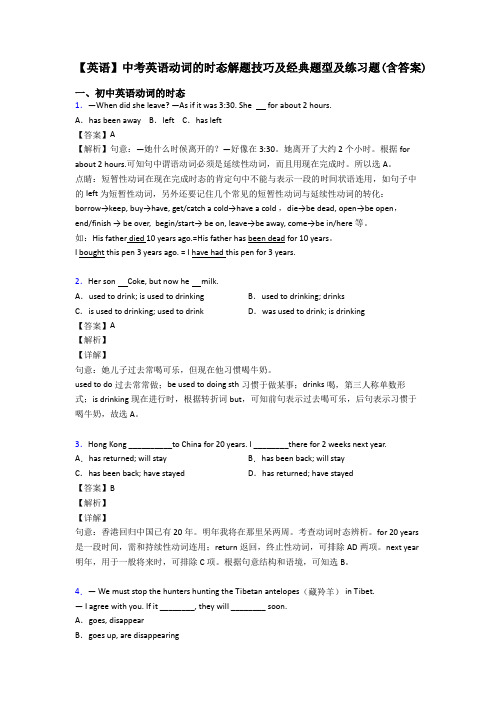
【英语】中考英语动词的时态解题技巧及经典题型及练习题(含答案)一、初中英语动词的时态1.―When did she leave? ―As if it was 3:30. She for about 2 hours.A.has been away B.left C.has left【答案】A【解析】句意:―她什么时候离开的?―好像在3:30。
她离开了大约2个小时。
根据for about 2 hours.可知句中谓语动词必须是延续性动词,而且用现在完成时。
所以选A。
点睛:短暂性动词在现在完成时态的肯定句中不能与表示一段的时间状语连用,如句子中的left为短暂性动词,另外还要记住几个常见的短暂性动词与延续性动词的转化:borrow→keep, buy→have, get/catch a cold→have a cold ,die→be dead, open→be open,end/finish → be over,begin/start→ be on, leave→be away, come→be in/here等。
如:His father died 10 years ago.=His father has been dead for 10 years。
I bought this pen 3 years ago. = I have had this pen for 3 years.2.Her son Coke, but now he milk.A.used to drink; is used to drinking B.used to drinking; drinksC.is used to drinking; used to drink D.was used to drink; is drinking【答案】A【解析】【详解】句意:她儿子过去常喝可乐,但现在他习惯喝牛奶。
used to do过去常常做;be used to doing sth习惯于做某事;drinks喝,第三人称单数形式;is drinking现在进行时,根据转折词but,可知前句表示过去喝可乐,后句表示习惯于喝牛奶,故选A。
中考英语动词的时态及其解题技巧及练习题(含答案)
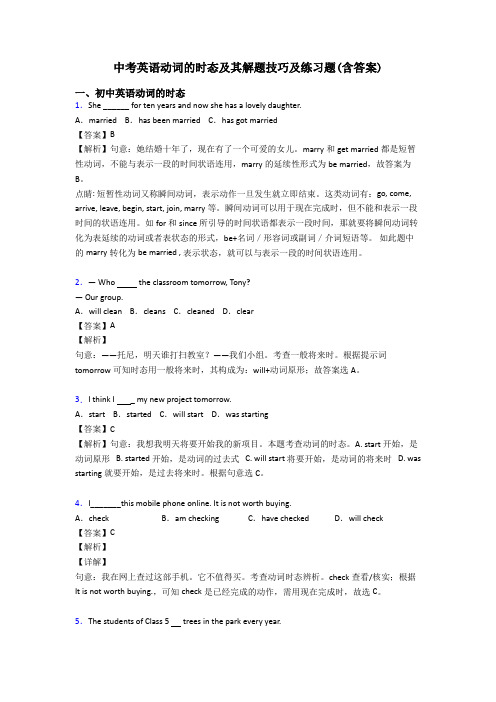
中考英语动词的时态及其解题技巧及练习题(含答案)一、初中英语动词的时态1.She ______ for ten years and now she has a lovely daughter.A.married B.has been married C.has got married【答案】B【解析】句意:她结婚十年了,现在有了一个可爱的女儿。
marry和get married都是短暂性动词,不能与表示一段的时间状语连用,marry的延续性形式为be married,故答案为B。
点睛: 短暂性动词又称瞬间动词,表示动作一旦发生就立即结束。
这类动词有:go, come, arrive, leave, begin, start, join, marry 等。
瞬间动词可以用于现在完成时,但不能和表示一段时间的状语连用。
如for 和since 所引导的时间状语都表示一段时间,那就要将瞬间动词转化为表延续的动词或者表状态的形式,be+名词/形容词或副词/介词短语等。
如此题中的marry转化为be married , 表示状态,就可以与表示一段的时间状语连用。
2.— Who the classroom tomorrow, Tony?— Our group.A.will clean B.cleans C.cleaned D.clear【答案】A【解析】句意:——托尼,明天谁打扫教室?——我们小组。
考查一般将来时。
根据提示词tomorrow可知时态用一般将来时,其构成为:will+动词原形;故答案选A。
3.I think I _ my new project tomorrow.A.start B.started C.will start D.was starting【答案】C【解析】句意:我想我明天将要开始我的新项目。
本题考查动词的时态。
A. start 开始,是动词原形 B. started 开始,是动词的过去式 C. will start 将要开始,是动词的将来时 D. was starting就要开始,是过去将来时。
【英语】中考英语动词的时态及其解题技巧及练习题(含答案)
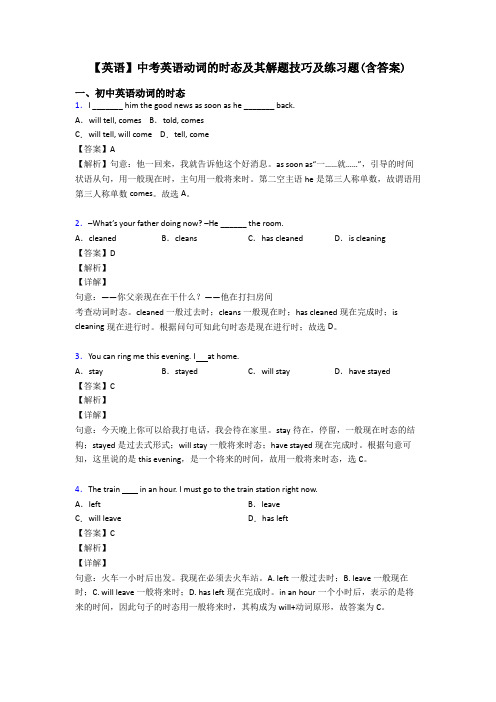
【英语】中考英语动词的时态及其解题技巧及练习题(含答案)一、初中英语动词的时态1.I _______ him the good news as soon as he _______ back.A.will tell, comes B.told, comesC.will tell, will come D.tell, come【答案】A【解析】句意:他一回来,我就告诉他这个好消息。
as soon as“一……就……”,引导的时间状语从句,用一般现在时,主句用一般将来时。
第二空主语he是第三人称单数,故谓语用第三人称单数comes。
故选A。
2.–What’s your father doing now? –He ______ the room.A.cleaned B.cleans C.has cleaned D.is cleaning【答案】D【解析】【详解】句意:——你父亲现在在干什么?——他在打扫房间考查动词时态。
cleaned一般过去时;cleans一般现在时;has cleaned现在完成时;is cleaning现在进行时。
根据问句可知此句时态是现在进行时;故选D。
3.You can ring me this evening. I at home.A.stay B.stayed C.will stay D.have stayed【答案】C【解析】【详解】句意:今天晚上你可以给我打电话,我会待在家里。
stay待在,停留,一般现在时态的结构;stayed是过去式形式;will stay一般将来时态;have stayed现在完成时。
根据句意可知,这里说的是this evening,是一个将来的时间,故用一般将来时态,选C。
4.The train in an hour. I must go to the train station right now.A.left B.leaveC.will leave D.has left【答案】C【解析】【详解】句意:火车一小时后出发。
初中英语动词的时态答题技巧及练习题(含答案)含解析

初中英语动词的时态答题技巧及练习题(含答案)含解析一、初中英语动词的时态1.The dog ________ several days ago. I felt very sorry for its ________.A.died;death B.died;died C.death;died D.death;death【答案】A【解析】【详解】句意:这只狗几年前就死了,我为它的死感到难受。
根据句意及根据可知第一个空出缺少谓语动词,又因为时间是过去,共过去时态。
根据句意及结构可知第二个空是名词。
die,动词,death,名词,故选A。
2.—Could you tell me what he said just now?—Sorry, I ___ about what I would do tomorrow.A.will think B.was thinking C.thought D.think【答案】B【解析】【详解】句意:你能告诉我他刚才说什么吗?对不起,我正考虑明天我要做什么。
考查时态。
A. will think(一般将来时);B. was thinking(过去进行时);C. thought (一般过去式);D. think(一般现在时);根据句意,“考虑”这个动作发生刚才在他讲话的时候,在过去某个时间点发生的动作用过去进行时,故选B。
3.—I’m not sure if my sister Vivian ____________ the driving test next week.— Please let me know if she ____________ it.A.has passed; passes B.passed ; will pass C.passes; has passed D.will pass; passes 【答案】D【解析】句意:-我不确定我姐妹Vivian下周是否可以通过驾驶考试。
- 1、下载文档前请自行甄别文档内容的完整性,平台不提供额外的编辑、内容补充、找答案等附加服务。
- 2、"仅部分预览"的文档,不可在线预览部分如存在完整性等问题,可反馈申请退款(可完整预览的文档不适用该条件!)。
- 3、如文档侵犯您的权益,请联系客服反馈,我们会尽快为您处理(人工客服工作时间:9:00-18:30)。
中考英语动词的时态解题技巧及练习题(含答案)一、初中英语动词的时态1.—What do you often do at weekends?—I often ________ my grandparents.A.visit B.visited C.have visited D.will visit【答案】A【解析】【详解】句意:你经常在周末做什么?——我经常去看我的爷爷奶奶。
考查句子时态。
A. visit 一般现在时;B. visited 一般过去时;C. have visited现在完成时;D. will visit一般将来时。
结合语境可知下文often可知是经常性动作,故用一般现在时态。
选A。
2.Her son Coke, but now he milk.A.used to drink; is used to drinking B.used to drinking; drinksC.is used to drinking; used to drink D.was used to drink; is drinking【答案】A【解析】【详解】句意:她儿子过去常喝可乐,但现在他习惯喝牛奶。
used to do过去常常做;be used to doing sth习惯于做某事;drinks喝,第三人称单数形式;is drinking现在进行时,根据转折词but,可知前句表示过去喝可乐,后句表示习惯于喝牛奶,故选A。
3.–What’s your father doing now? –He ______ the room.A.cleaned B.cleans C.has cleaned D.is cleaning【答案】D【解析】【详解】句意:——你父亲现在在干什么?——他在打扫房间考查动词时态。
cleaned一般过去时;cleans一般现在时;has cleaned现在完成时;is cleaning现在进行时。
根据问句可知此句时态是现在进行时;故选D。
4.---Helen, When did you moved here?---I______ here since two years ago.A.moved B.lived C.have moved D.have lived【答案】D【解析】试题分析:句意:―海伦,你什么时候搬到这儿的?―从两年前我就住在这儿。
表示从两年前一直延续到现在的动作,用现在完成时态,A、B错。
move是一个非延续性的动作,不能与表示一段时间的状语since two years ago连用,live是延续性动作,可以与since two years ago连用。
故选D。
【考点定位】考查动词时态辨析。
5.They the English role play for the show last night.A.will practice B.practiced C.is practicing D.have practiced【答案】B【解析】句意:昨天晚上为了演出他们练习了英语角色扮演。
考查一般过去时。
根据提示词last night可知时态用一般过去时,“练习”practice,其过去式为practiced,故答案选B。
6.The students of Class 5 trees in the park every year.A.plant B.will plant C.planted D.plants【答案】A【解析】【详解】句意:五班的学生每年在公园植树。
根据时间状语every year句子应该用一般现在时,句子的主语students是复数形式,所以谓语动词用原形。
故选A。
7.--- May I speak to John?--- Sorry, he ____________Japan. But he _________in two days.A.has been to, will come backB.has gone to, will be backC.has been in, would come backD.has gone to, won't cone back【答案】B【解析】【详解】句意“-我可以和约翰通话吗?-抱歉,他去了日本,两天后回来”。
have been to去了某地(回来了);have gone to去了某地(还没回来);C.have been in曾经待在某地。
根据句意可知,表示“约翰去了日本,还没回来”,第二空后in+一段时间表示将来,用一般将来时,故选B。
8.—Why didn't you open the door for me just now?—Sorry,I a bath.A.will take B.am taking C.was taking D.take【答案】C【解析】【详解】句意:--刚才你为什么不给我开门?--对不起,我在洗澡。
根据didn't you open the door这里叙述的是过去的事情,根据句意可知该开门的时间正在洗澡,也就是说过去某个时间正在进行的动作,应该用过去进行时。
过去进行时的谓语动词的形式是:was/were+doing,故选C。
9.--- Will you go to America next month?---Yes. But I promise I will call you as soon as I _________there.A.get to B.will get to C.will get D.get【答案】D【解析】【详解】句意:——下个月你将要去美国吗?——是的。
但是我保证我一到达那里,就给你打电话。
as soon as引导的时间状语从句,用一般现在时,主句用一般将来时。
there是副词,前面不加介词,get there到达那里。
故选D。
10.—Why _______ let Tom go to the supermarket with us?—Sorry, he ________ his homework yet.A.you don’t; has finished B.don't; has finishedC.not to; didn’t finish D.not; hasn’t finished【答案】D【解析】句意:-你为什么不让汤姆和我们一起去超市?-对不起,他还没有完成作业。
你为什么不做某事?Why don’t you do sth?=Why not do sth?主语you与助动词do同时省略或是同时保留。
后句描述的是已经发生或完成的动作,强调过去发生的动作对现在造成的影响或结果,句子用现成完成时态。
他不能去超市,是因为他还没有完成作业,因此后句用现在完成时态的否定形式。
故选D。
11.--Look! There____ so many noisy kids in the room!--Haven’t you heard the saying “When the cat is away, the mice _____?”A.have; play B.is; are going to playC.have; are playing D.are; will play【答案】D【解析】【详解】句意“-看!房间里有许多吵闹的小孩-你没听见他们在说,当猫离开后,这些老鼠在玩吗?”。
there be句型不与have连用,排除A和C,且第一空处主语为so many noisy kids,谓语用复数,排除B,第二空处when引导的从句用一般现在时,主句用一般将来时,即“主将从现”原则,故选D。
12.— Do you know _____ a wonderful match and two basketball matches on July 15 th ?— Yeah . I am going to watch them on that day.A.there will be B.there is going to have C.there are going to be D.is there going to be【答案】A【解析】【详解】句意:——你知道7月15日会有一场精彩的比赛和两场篮球赛吗?——是的。
那天我要去看它们。
考查there be结构。
宾语从句需用陈述句语序,D是疑问句语序,可排除。
根据句意语境,本句用一般将来时。
there be 结构的一般将来时用there will be 和there is going to be,表示最近要做的事,可排除B。
根据就近原则,a wonderful match一场精彩的比赛,需用there is going to be,可排除C项。
综合以上,可知选A。
13.Peter and Linda Beijing for Shanghai yesterday afternoon.A.leave B.left C.are leaving D.will leave【答案】B【解析】【详解】句意:昨天下午Peter和 Linda离开北京去上海了。
短语leave +某地+for+某地“离开某地去某地”根据yesterday afternoon可知,句子应该用一般过去时,故选B。
14.—I wonder when you _______the new watch .—Well , I _______it for two weeks .A.have bought, have had B.bought, have hadC.bought, have bought D.have bought, have bought【答案】B【解析】句意:——我想知道你什么时候买的这个新手表。
——我买了两周了。
问什么时候买的,用过去时态,排除A/D;根据for two weeks可知用延续性动词,buy买,短暂性动词,have买,拥有,延续性动词;故选B15.一Guilin is a wonderful place. I there many years ago.一Yes. I there many times.A.went; have been B.have gone; wentC.went; have gone D.have been;went【答案】A【解析】句意:-桂林是个很棒的地方。
我多年前去过那里。
-是的。
我去过那里很多次。
many years ago很多年前,跟一般过去时态连用,所以谓语动词使用go的过去式went。
下文表示过去的动作对现在造成的影响与结果,所以谓语动词使用现在完成时态,have/has+动词的过去分词,have/has been to.. , 意为“曾经去过某地”,有“去过某地”的经历; have/hasgone to…, 意为“去了某地”,人不在说话地点。
